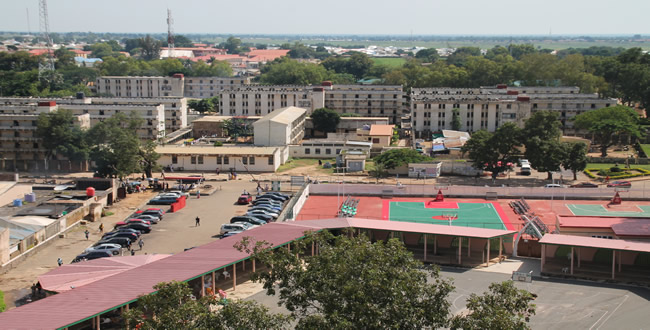
Zaria
Latitude: 11.0789 Lat (DMS) 11° 4' 44N
Longitude: 7.7104 Long (DMS) 7° 42' 37E
Elevation (Feet): 2509
Population Est.(2006):298726
Zip Code: 810222
History
Zaria is a major city in Kaduna State in Northern Nigeria, as well as being a Local Government Area. Formerly known as Zazzau, it was one of the original seven Hausa city-states. In the late 1450s, Islam arrived in Zaria by the way of its sister Habe cities, Kano and Katsina. Along with Islam, trade also flourished between the cities as traders brought camel caravans filled with salt in exchange for slaves and grain.
Between the fifteenth and sixteenth century the kingdom became a tributary state of the Songhai Empire. In 1805 it was captured by the Fulani during the Fulani Jihad. British forces led by Frederick Lugard took the city in 1901.
A French hostage of the Islamist group Ansaru, held captive at Zaria,managed to escape in 2013 and reach a police station in the city.
The old part of the city, known as Birnin Zazzau or Zaria-City, was originally surrounded by walls and fortress, which now have been mostly removed. The Emir's palace is located in the old city. In the old city and the adjacent Tudun Wada neighbourhood people typically reside in traditional adobe compounds.
These two neighborhoods are predominantly occupied by the indigenous Hausa. The neighborhoods of Samaru and Sabon Gari are predominantly occupied by Nigerians of southern origin, such as the Igbo.
The largest marketplace is in Sabon Gari. Other more recent neighborhoods include: Danmagaji/Wusasa, PZ, Kongo, GRA-Zaria, Hanwa, Bassawa, Lowcost Kofan-Gayan and Shikka
Zaria Emirate
The Zazzau, also known as the Zaria Emirate is a traditional state with headquarters in the city of Zaria, Kaduna State, Nigeria. As of September 2015 the emir was Alhaji Shehu Idris
Our most important source for the early history of Zazau is a chronicle composed in the early twentieth century from oral tradition. It tells the traditional story of the foundation of the Hausa kingdoms by Bayajidda, a culture hero and gives a list of rulers, along with the length of their reigns. According to this chronology, the original Hausa or Habe kingdom is said to date from the 11th century, founded by King Gunguma. This source also makes it one of the seven Hausa Bakwai states.
Zazzau's most famous early ruler was Queen (or princess) Amina, who ruled either in the mid-fifteenth or mid-sixteenth centuries, and was held by Muhammed Bello, an early nineteenth century Hausa historian and the second Sultan of Sokoto, to have been the first to establish a kingdom among the Hausa.
Zazzau was a collection point for slaves to be delivered to the northern markets of Kano and Katsina, where they were exchanged for salt with traders who carried them north of the Sahara.
According to the history in the chronicle, Islam was introduced to the kingdom around 1456, but appears to have spread slowly, and pagan rituals continued until the Fulani conquest of 1808. At several times in its history, Zazzau was subject to neighboring states such as Songhai, Bornu and Kwararafa.
In December 1808 the kingdom was captured in the Fulani jihad. The Hausa ruler had escaped to Abuja, where he established a state now known as the Suleja Emirate, retaining his independence and the title of "Sarkin Zazzau".
The ruler of the modern Zazzau Emirate also uses the title "Sarkin Zazzau" or "Sarkin Zaria". After the jihad, the culturally similar but pastoral or nomadic Fulani intermarried with the more settled Habe farmers, and the people of the Emirate today are generally known as Hausa-Fulani. The government of the Zaria Emirate differed from other emirates created at this time in that offices were rarely hereditary, but were appointed based on merit or obligation
Rulers of the Hausa kingdom
- Bako III dan Musa
- Ishaq
- Burema II Ashakuka
- Bako IV dan Sunkuru
- Muhamman dan Gunguma
- Uban Bawa
- Muhamman Gani
- Abu Muhammadu Gani
- Dan Ashakuka
- Muhamman Abu III
- Bawo
- Yunusa
- Yaqub
- Aliyu
- Cikkoku
- Muhamman Mai Gamo
- Ishaq Jatau
- Muhammad Makau dan Ishaq Jatau
- Malam Musa ibn Suleiman Ibn Muhammad
- Yamusa ibn Mallam Kilba
- Abd al-Karim ibn Abbas
- Hammada ibn Yamusa
- Muhammad Sani ibn Yamusa
- Sidi `Abd al-Qadir ibn Musa
- Abd as-Salam ibn Muhammad Ka'i
- Abd Allah ibn Hammada (1st time)
- Abu Bakr ibn Musa (d. 1873)
- Abd Allah ibn Hammada (2nd time)
- Muhammad Sambo ibn Abd al-Karim
- Uthman Yero ibn Abd Allah (d. 1897)
- Muhammad Lawal Kwassau ibn Uthman Yero
Banks in Kaduna
Brief History of Kaduna
Business and Economy
Festivals and Carnivals
General and Teaching Hospitals
Hotels and Guest Houses
Kaduna State Ministries Agencies and Parastatals
Police Stations
Popular Markets
Prominent Towns
Restaurants, Bars, Night Clubs
Shopping Malls
Tourist Attractions
Traditional Games
Connect With Us
 |  |  |  |
